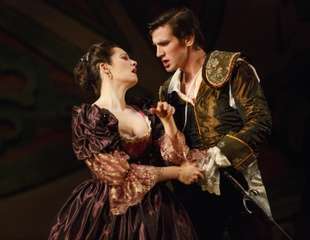|
Back
A dazzling revival Toronto
The Elgin Theatre
04/26/2014 - 1 April 27*, 29, 30, May 2, 3, 2014
Jean-Baptiste Lully: Persée
Mireille Asselin (Andromède), Christopher Enns (Persée), Peggy Kriha Dye (Mérope), Vasil Garvanliev (Phinée), Olivier Laquerre (Céphée, Méduse), Carla Huhtanen (Cassiope), Lawrence Wiliford (Mercure, Corite), Meghan Lindsay (Nymphe Guerrière, Vénus), Aaron Ferguson (Euryale, Amphimédon), Stephen Hegedus (Proténor, Divinité Infernale), Curtis Sullivan (Grand Prêtre, Cyclope, Sténon, Triton), Artists of Atelier BalletMarshall Pynkoski
Tafelmusik Chamber Choir, Ivars Taurins (Choir Director), Tafelmusik Baroque Orchestra, David Fallis (conductor)
(Director), Gerard Gauci (Set Designer), Dora Rust D’Eye, Michael Legouffe (Costume Designers), Jeannette Lajeuness-Zingg (Choreographer), Bonnie Beecher (Lighting Designer), Jennifer Parr (Fight Director)

M. Asselin, C. Enns (© Bruce Zinger)
Opera Atelier’s production of Lully’s Persée was the company’s major millenium project back in 2000; it was revived in 2004, the same year it was the basis for a stylish if inarticulate made-for-TV film. The current incarnation, with even more opulent sets and costumes than before, will also be seen at the Royal Opera in Versailles (where the work was last produced at that theatre’s opening in 1770). This will be the second OA production taken to Versailles.
While the work is skimpy with respect to psychological insight or development, it is rich in incident and action. Persée, son of Jupiter, must undertake several heroic feats in order to win and keep his beloved, Andromède. There are romantic complications: Andromède has been promised to her uncle, Phinée, while Mérope, sister of Queen Cassiope, is in love with Persée. Persée ingeniously beheads the hideous Méduse, earning the ardent thanks of the subjects of Ethiopia (that is the name appended to the legendary kingdom). There is more to come: Andromède is chained to a rock by hostile gods Junon and Neptune; Persée has to rescue her by slaying a sea monster, delightfully portrayed by the dragon OA uses in its production of Die Zauberflöte. The vengeful Phinée simply will not give up, and just when the lovers are celebrating their wedding, he attacks with his gang of assassins. During the breathtaking battle Mérope is killed; it ends when Persée brandishes the severed head of Méduse to turn his opponents into stone, one of many marvellous coups de théâtre.
The production’s fight director, Jennifer Parr, has worked wonders, thanks in part to the use of two dancers as doubles for Persée (let’s face it, few tenors if any are capable of doing a one-arm backflip, or of hurling a male dancer over his shoulders).
Mireille Asselin and Christopher Enns as the two central lovers are both blessed with youthful clear voices and expressive diction. One almost wishes their roles were longer, although the work lasts almost three hours with one intermission. The various gods and goddesses all get due stage time and many fine sentiments are expressed. Some of the music seems merely serviceable, but the stage picture is always first rate when it isn’t deliciously over the top. Director Marshall Pynkoski never flinches from the camp side of things - in fact he ups the camp quotient at times, as when Méduse and her gorgons are portrayed by three baritones. Not to mention that sea monster.
OA regulars are out in force - Vasil Garvanliev as the determined Phinée, Peggy Kriha Dye as the lovelorn Mérope, Carla Huhtanen as the anxious queen, Lawrence Wiliford as Mercure, and Olivier Laquerre as both the king and Méduse. Meghan Lindsey shines as Venus, the goddess who elevates the two lovers to the starry heavens where they remain today as constellations. For this scene we are treated with two theatrical flying machines - what more could one want?
David Fallis keeps it all together despite the fact that the 22-member chorus, some orchestral players and occasionally soloists perform from the stage boxes. (There is at times just too much action for the Elgin Theatre’s smallish stage.) The Tafelmusik Baroque Orchestra, in its 30-member configuration, maintains its customary vibrant tone. And of course there is lots of dancing.
Upcoming: after the excursion to Versailles, Opera Atelier’s 2014-15 season will consist of Handel’s Alcina and Gluck’s Orphée et Eurydice, using Hector Berlioz’s version.
Michael Johnson
|